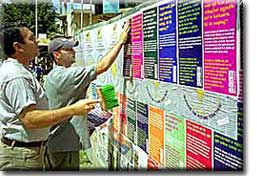Three Years Later: State-Building in Kosovo
Image on right: OSCE workers put up flyers as part of an information campaign for voter's services during Kosovo's 2001 elections.
Photo courtesy of OSCE
 Can the Kosovo government create conditions for a viable free market economy? What does the international community need to do to assist key reforms? Will Serbs and others be able to return home in a more tolerant environment? What can be done to fight organized crime, corruption and smuggling and promote accountability in the region? What options are viable for final status? The U.S. Institute of Peace hosted a special open and on the record session of its Balkans Working Group to explore these questions and more. Moderated by Balkans Initiative Director Dan Serwer the session featured an address and question and answer session with Veton Surroi, chairman of the KOHA Media Group in Pristina.
Can the Kosovo government create conditions for a viable free market economy? What does the international community need to do to assist key reforms? Will Serbs and others be able to return home in a more tolerant environment? What can be done to fight organized crime, corruption and smuggling and promote accountability in the region? What options are viable for final status? The U.S. Institute of Peace hosted a special open and on the record session of its Balkans Working Group to explore these questions and more. Moderated by Balkans Initiative Director Dan Serwer the session featured an address and question and answer session with Veton Surroi, chairman of the KOHA Media Group in Pristina.
Speaker:
- Veton Surroi, chairman of the KOHA Media Group in Pristina.
Moderator:
- Dan Serwer, Director, Balkans Initiative, U.S. Institute of Peace




